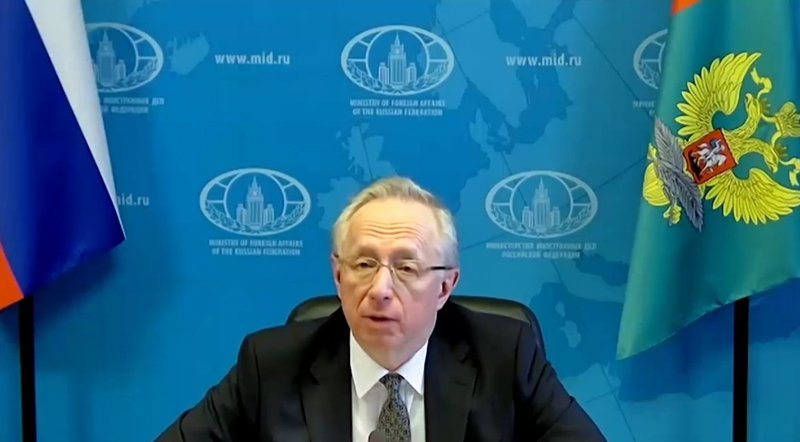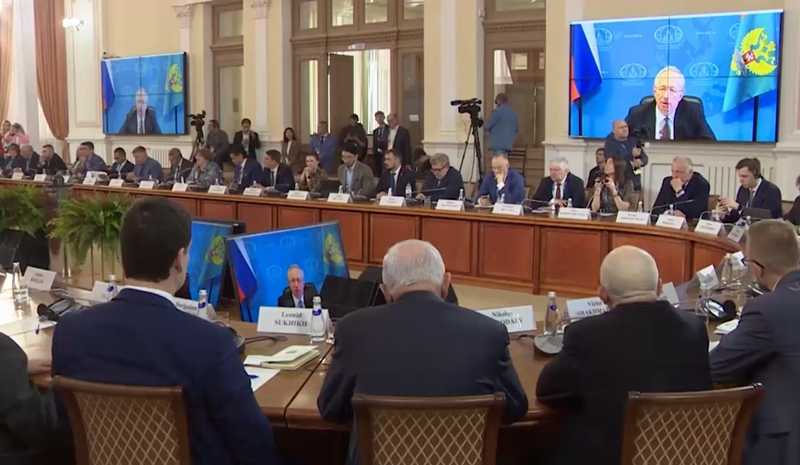Mikhail Galuzin, Deputy Minister of Foreign Affairs of the Russian Federation, spoke about the current economic and humanitarian cooperation between Russia and Central Asian countries
Russia remains a key trade and economic partner of Central Asia with a high share of presence in the region’s economy and is one of the main consumers of products manufactured in Central Asian countries. This was stated by Deputy Minister of Foreign Affairs of the Russian Federation Mikhail Galuzin, speaking online at the 3rd Central Asian Conference of the Valdai International Discussion Club in Tomsk.
Here are the key points and indicators from Galuzin’s remarks regarding the current state of economic and humanitarian cooperation between the countries of Central Asia and Russia:
The participation of countries in the CIS and membership of Russia, Kazakhstan, Kyrgyzstan in the EAEU play a significant role in the consolidation of trade and economic ties.
In 2022, the trade turnover between Russia and the countries of Central Asia increased by 20% and amounted to US $ 41 billion.
In 2022, Russian direct investments in the economy of the area totaled more than US $ 3.6 billion.
The accumulated investments since 2015 are estimated at US $25 billion.
Investments of Central Asian countries in Russia also increased 4-fold and reached more than US $ 4 billion.
More than 10,000 Russian and joint ventures operate in the region, over 900,000 jobs have been created.
Galuzin also highlighted the role of the international transport corridor “North-South”. “Today, the fastest way to implement this project is to use the Trans-Caspian and Eastern routes, since these branches are formed on the basis of existing infrastructure,” he said. [The eastern branch of the INSTC travels from Russia, through Kazakhstan and Turkmenistan, to Iran and further to India and the countries of the Middle East.Ed.]
The absence of visa barriers and language difficulties make the Russian labor market very attractive and almost without alternative for Central Asian citizens seeking job abroad.
In 2022, the volume of remittances by migrant workers to Uzbekistan amounted to 11% of the country’s GDP, to Kyrgyzstan – over 26% of GDP.
Russia remains the absolute leader in promoting school education and training in the region. In Kyrgyzstan, it is planned to open branches of Moscow State University, Kazan Federal University, Higher School of Economics, in Uzbekistan – Russian Humanitarian University, Moscow State University of Cartography and Geodesy, North Caucasus Federal University.
A project to establish a joint Turkmen-Russian university in Ashgabat is at the approval stage, and all this will be a solid addition to the 25 branches of Russian universities already operating in the region. Of these, Kazakhstan hosts 6 branches, Kyrgyzstan – 2, Tajikistan – 3, Uzbekistan – 14.
To date, about 185,000 students from Central Asian countries study in Russia, including 60,000 citizens of Kazakhstan, 46,000 citizens of Uzbekistan, 31 thousand from Turkmenistan, 30,000 from Tajikistan, 16,000 from Kyrgyzstan. Of these, about 68,000 students, or 40% of the total number of students from Central Asia study at the expense of the Russian budget.
Russia is committed to steadily enhancing its strategic alliance and partnership ties with its Central Asian friends. The Central Asia + Russia conversation format has played a significant role in this and will continue to do so.
Galuzin recalled that last year the first summit of this format was held, and last month a meeting of foreign ministers took place. “Discussions and adopted decisions have once again clearly demonstrated the broad prospects and rich potential of our alliance and strategic partnership with the Central Asian states. We will continue this line,” he said.
***
On 16-17 May, Tomsk hosts the III Central Asian Conference of the Valdai International Discussion Club. The theme of the current conference is “Russia and Central Asia: Aligning With a Changing World”. The theme of the conference is devoted to the conjugation of the interests of Russia and the countries of the region with the changing world, understanding where the priorities of Russia and Central Asia are aligned, and where they diverge from the logic of global events. The mission of the Central Asian Conference of the Club is to provide Russian and foreign experts with the opportunity to analyze these issues and come to consensus on solutions to the ongoing developments. ///nCa, 16 May 2023

